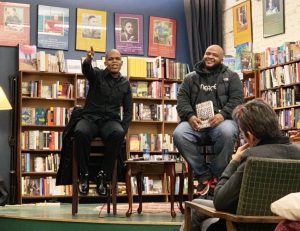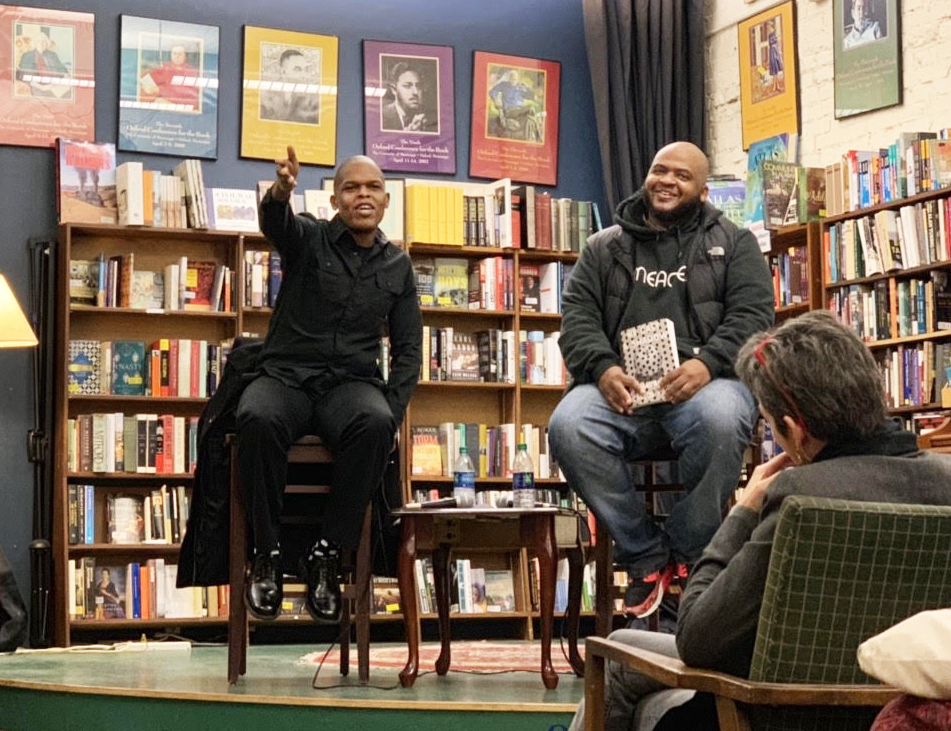Author Maurice Carlos Ruffin quietly rose from the high-top chair next to fellow writer and Ole Miss professor Kiese Laymon. Printed sheets in hand, he stepped forward and recounted his nameless narrator’s nightmarish office Halloween party.

Ruffin, a New Orleans native and lawyer, read an excerpt from and answered questions about his debut novel “We Cast a Shadow” Friday evening at Off Square Books.
Set in the South in the near future and described by The New York Times as a “satire that guts American racism,” the book describes the narrator’s journey to to afford treatment for his son’s growing birthmark by working his way to the top of a law firm.
After initial introductions, Laymon recounted first meeting Ruffin in Miami. Laymon said the lawyer-turned-novelist boldly stated that he would become the best novelist from New Orleans. “We Cast a Shadow” could be the first step to that goal.
“I’d never read anything by this brother. Usually those sort of audacious statements are followed by a lot of bravado,” Laymon said. “But after a few minutes with Maurice, I saw this commitment to tenderness that I rarely see in men, and he somehow was able to bring that audacity and that tenderness to this amazing book. When I read (“We Cast a Shadow”), I wondered, ‘Can he really, really write? Can he really pull off that shit?’ And he more than pulled it off.”
When asked about Nigel, the narrator’s son, Ruffin said he thinks a lot about the duality of the narrator’s decision to look into the “demelanization” of his son — what he assumes is the lesser of two evils.
“I think that Nigel represents a lot of people in America,” Ruffin said. “Black folks, first and foremost, but also transgender people and women, often, in this society which is so patriarchal and misogynistic. I think all the time about how we expound the ideals of equality — like acting as Christians, for example — and yet, the physical decisions we make toward each other are often so damaging and hurtful.”
Along the same lines, Ruffin described how best to protect young, black children who are growing up in the Deep South. Ruffin believes that keeping black children safe starts with caring for them.
“First, we have to give them a sense of pride, self-love,” Ruffin said. “You treat them well, you feed them well, you hug them.”
Ruffin said he has always considered himself a novelist, but this wasn’t without forays into short stories and essays before he decided to take the plunge into “We Cast a Shadow.”
“I think writing a novel is a way to approach a question that is bigger than your brain,” Ruffin added.
In 2014, Eric Garner, a 43-year-old black man, died after an NYPD officer put him in a chokehold. That same year, Tamir Rice, a black 12-year-old, was shot by a Cleveland police officer.
After discussing these high-profile cases, Ruffin said he didn’t understand the reasons behind such violence. After being unable to answer the question for himself, Ruffin said he decided that his narrator should be the one to find the answer.
“I basically said subconsciously to my protagonist, ‘I’m going to assign you this problem, and I want you to work on it nonstop for the next four years,’” Ruffin said. “So, basically, he’s been working on this problem, and the novel is a result of that.”
Corey Davis, a junior English major, said she enjoyed the fluidity of Ruffin’s recitation because his verbal performance of excerpts from the novel strayed from the exact written wording.
“I liked that he performed his book in real time and changed things about it,” Davis said. “It’s cool to think that, even though his book is in print and permanent, it can still be altered and made better. In that way, it’s like art.”















